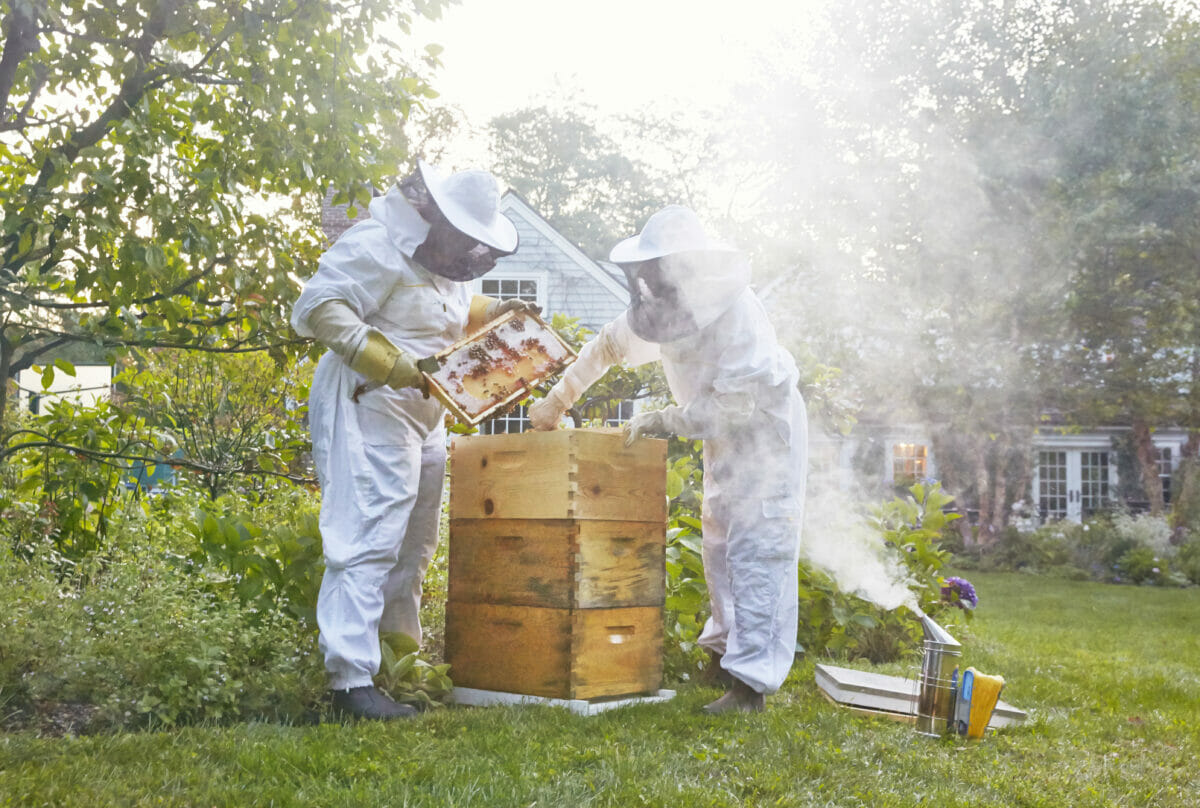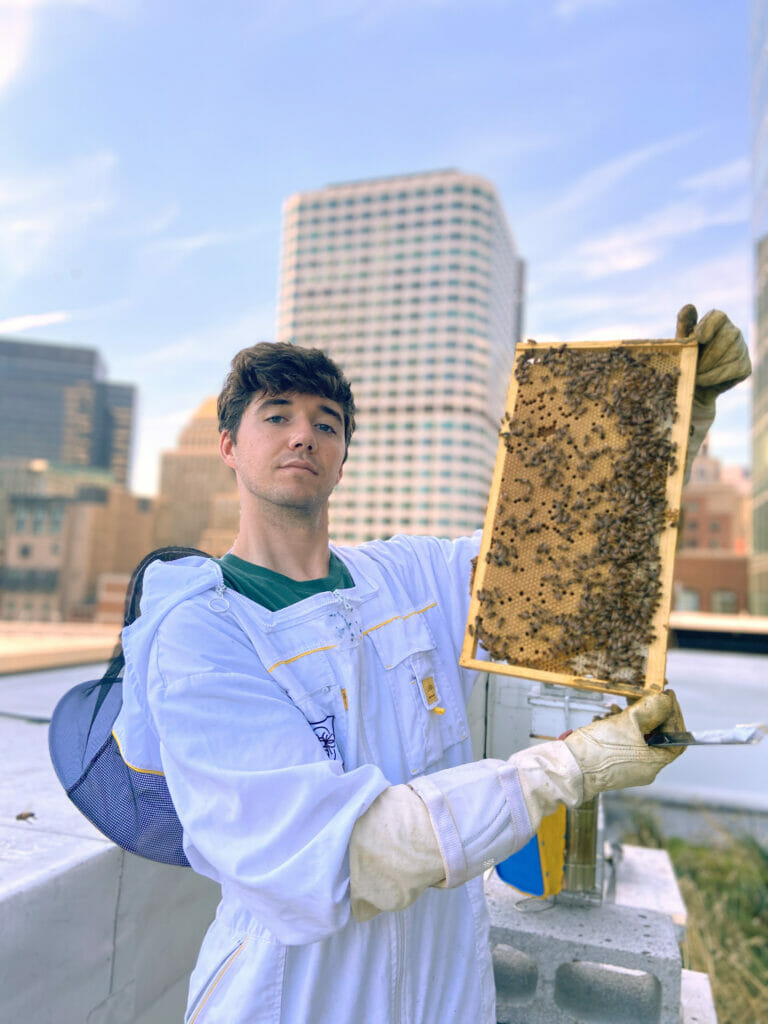These Companies Will Do the Beekeeping For You
Maintaining a beehive can be tricky and time-consuming, but these companies make it easy—and enjoyable—to participate in an act of environmental stewardship.
These Companies Will Do the Beekeeping For You
Maintaining a beehive can be tricky and time-consuming, but these companies make it easy—and enjoyable—to participate in an act of environmental stewardship.

Beekeeping made easy.courtesy of Best Bees.
Picture yourself relaxing in your yard; maybe you’re dining alfresco, reading a book or simply taking a five-minute work break. You watch honeybees flit around before flying back to a beehive. Sounds dreamy, right? The daydream is a reality for those with honey hives.
“They are wonderful to have on the property,” says Cassy Pickard, who has two beehives on her land in Massachusetts. “My garden has been incredibly improved by having the honeybees.”
Beekeeping has become increasingly popular, especially in urban areas. According to the Agricultural Marketing Resource Center, there are anywhere from 115,000 to 125,000 beekeepers in the US. However, that number doesn’t include beekeepers with less than five hives, which past data suggests may add an additional 80,000 beekeepers.
Yet, Pickard is not one of them. Her beehives are managed professionally by Best Bees, one of the oldest residential and commercial beekeeping companies. “They take care of the bees, they feed them for the winter; they’re really just fantastic,” says Pickard.
Starting and maintaining a beehive can be tricky. They require continuous care and maintenance. That’s where companies such as Best Bees and others, such as the Wisconsin-based Kinni Bees and Buddha Bee Apiary in North Carolina come in.
The services, which range in price but average at about $100 to $200 per month (not including the initial installation of the beehive), come with a guaranteed amount of honey per year, although not all of it may come from your hive.
“Most of the people who sign up aren’t in it for the honey. That’s a fun piece for them, but it’s often more about getting to connect with the natural environment in a really unique way,” says Alfredo Salkeld of Buddha Bee Apiary. “Some of the people who sign up want to become beekeepers, some just love watching the bees or want their kids to understand the importance of pollinators.”
You don’t need a huge outdoor space for a beehive. Some of the companies have installed hives on balconies. What’s most important is that you have an area that gets good sunlight and a place where the beehives can live without too much commotion. No letting your kids or dogs knock over the hive.
Pickard, who has both a dog and grandkids, says she hasn’t had any issue with the bees. Not only are they gentle, she says, but they’ve become a part of all of their lives.
“I believe philosophically that it’s very important to create sustainable living in a multitude of ways and honeybees are part of that,” Pickard says.
Honeybees and other pollinators are responsible for at least a third of our food supply, yet they’re in decline. According to the National Colony Loss and Management Survey, between April 2019 and April 2020 alone, beekeepers reported losing nearly 44 percent of their colonies.
Justin Maness, the founder of Buddha Bee, was doing field research on the effects of pesticides on bees when he came up with the idea for the company.
“The thinking was if more people could witness the challenges and the magic of bees, we could make an impact,” says Salkeld.
Like Buddha Bee, Best Bees and Kinni Bees have a strong desire to improve the health of pollinators. For Best Bees, that starts with research, which the nearly 12-year-old company has a lot of.
“Science is really limited in the ability to actually measure and quantify the health of native pollinators in a given area,” says Best Bees beekeeper and sales manager Sam Jennings. “By utilizing honeybees as an indicator species, we can start to draw some conclusions and then when we work with our research partners, we can layer in additional information specific to habitat roam time, what is available forage for bees and more.”

Best Bees’ nonprofit, the Urban Beekeeping Laboratory and Bee Sanctuary, conducts studies to improve the health of pollinators.
Pollinator health is a significant problem, and people, including beekeepers, are coming at it from different angles. In Wisconsin, Kinni Bees, which is in its second year of managing residential hives, sees its hives as a way to strengthen the genome of bees.
“Having the hives in different locations exposes the bees to different genomes within the bee colony itself,” Mike James of Kinni Bees says. “Our goal is over several years to have a genome in our bees that can survive the Varroa mites [a parasite that attacks and feeds on honey bees]. And that rather than spend time cooling the hive or warming the hive, because it’s insulated, the bees will spend time grooming each other, actually taking the Varroa mites off of each other.”
For Pickard and others with managed hives, though, the magic is in watching the bees. “My grandchildren will hold their arms out and the honeybees will land on them and they talk to them,” she says.
Follow us
This work is licensed under a Creative Commons Attribution-NoDerivatives 4.0 International License.
Want to republish a Modern Farmer story?
We are happy for Modern Farmer stories to be shared, and encourage you to republish our articles for your audience. When doing so, we ask that you follow these guidelines:
Please credit us and our writers
For the author byline, please use “Author Name, Modern Farmer.” At the top of our stories, if on the web, please include this text and link: “This story was originally published by Modern Farmer.”
Please make sure to include a link back to either our home page or the article URL.
At the bottom of the story, please include the following text:
“Modern Farmer is a nonprofit initiative dedicated to raising awareness and catalyzing action at the intersection of food, agriculture, and society. Read more at <link>Modern Farmer</link>.”
Use our widget
We’d like to be able to track our stories, so we ask that if you republish our content, you do so using our widget (located on the left hand side of the article). The HTML code has a built-in tracker that tells us the data and domain where the story was published, as well as view counts.
Check the image requirements
It’s your responsibility to confirm you're licensed to republish images in our articles. Some images, such as those from commercial providers, don't allow their images to be republished without permission or payment. Copyright terms are generally listed in the image caption and attribution. You are welcome to omit our images or substitute with your own. Charts and interactive graphics follow the same rules.
Don’t change too much. Or, ask us first.
Articles must be republished in their entirety. It’s okay to change references to time (“today” to “yesterday”) or location (“Iowa City, IA” to “here”). But please keep everything else the same.
If you feel strongly that a more material edit needs to be made, get in touch with us at [email protected]. We’re happy to discuss it with the original author, but we must have prior approval for changes before publication.
Special cases
Extracts. You may run the first few lines or paragraphs of the article and then say: “Read the full article at Modern Farmer” with a link back to the original article.
Quotes. You may quote authors provided you include a link back to the article URL.
Translations. These require writer approval. To inquire about translation of a Modern Farmer article, contact us at [email protected]
Signed consent / copyright release forms. These are not required, provided you are following these guidelines.
Print. Articles can be republished in print under these same rules, with the exception that you do not need to include the links.
Tag us
When sharing the story on social media, please tag us using the following: - Twitter (@ModFarm) - Facebook (@ModernFarmerMedia) - Instagram (@modfarm)
Use our content respectfully
Modern Farmer is a nonprofit and as such we share our content for free and in good faith in order to reach new audiences. Respectfully,
No selling ads against our stories. It’s okay to put our stories on pages with ads.
Don’t republish our material wholesale, or automatically; you need to select stories to be republished individually.
You have no rights to sell, license, syndicate, or otherwise represent yourself as the authorized owner of our material to any third parties. This means that you cannot actively publish or submit our work for syndication to third party platforms or apps like Apple News or Google News. We understand that publishers cannot fully control when certain third parties automatically summarize or crawl content from publishers’ own sites.
Keep in touch
We want to hear from you if you love Modern Farmer content, have a collaboration idea, or anything else to share. As a nonprofit outlet, we work in service of our community and are always open to comments, feedback, and ideas. Contact us at [email protected].by Bridget Shirvell, Modern Farmer
March 16, 2022
Modern Farmer Weekly
Solutions Hub
Innovations, ideas and inspiration. Actionable solutions for a resilient food system.
ExploreExplore other topics
Share With Us
We want to hear from Modern Farmer readers who have thoughtful commentary, actionable solutions, or helpful ideas to share.
SubmitNecessary cookies are absolutely essential for the website to function properly. This category only includes cookies that ensures basic functionalities and security features of the website. These cookies do not store any personal information.
Any cookies that may not be particularly necessary for the website to function and are used specifically to collect user personal data via analytics, ads, other embedded contents are termed as non-necessary cookies.